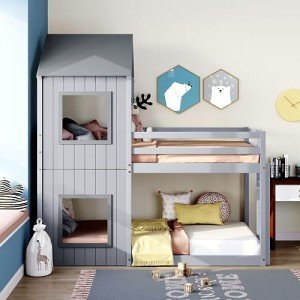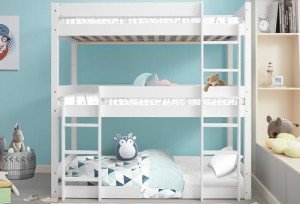
25
JuneThe 9 Things Your Parents Taught You About Bunk Beds For Kids
Bunk Beds for Kids: A Comprehensive Guide
Bunk beds have actually been a popular option for kids's bedrooms for several years. They use a space-saving solution that takes full advantage of flooring area, supplies fun climbing alternatives, and can be found in a variety of styles that interest children's creativities. This article checks out the advantages, considerations, styles, and safety functions associated with bunk beds for children.

Advantages of Bunk Beds
Bunk beds present multiple advantages that make them an appealing option for families. Here are some key benefits:
Space Saving
- Bunk beds enable two or more children to share a room without compromising space for play or other activities.
Cost-efficient
- Purchasing a single bunk bed can be more cost-effective than buying two different beds.
Enjoyable Factor
- Kids often see bunk beds as an enjoyable place to sleep and play, cultivating a sense of experience.
Flexibility
- Bunk beds are available in various configurations, consisting of L-shaped, loft beds, and even convertible designs that can alter as kids grow.
Company
- Lots of bunk beds feature integrated storage options, such as racks and drawers, helping keep rooms organized.
Key Considerations Before Purchasing
Before buying a bunk bed, it's necessary to think about particular factors, such as:
Space Requirements
Measure the space to ensure that there is enough vertical space, enabling appropriate headroom on the leading bunk.
Age of Your Children
Consider their age and maturity. Many producers recommend that kids under six should not oversleep the leading bunk due to security issues.
Weight Limit
It's vital to examine the weight limits of the bunk bed for both the top and bottom bunks to ensure safety.
Design Preferences
Choose a design that matches the room's design and the children's choices.
Material
Bunk beds are available in various products, such as wood or metal. Each has its advantages and disadvantages relating to durability and looks.
Designs of Bunk Beds
Bunk beds can be found in different designs to fit different visual appeals and functional needs. Here's a list of some popular designs:
Standard Bunk Beds
Timeless stacked beds that consist of two beds built one above the other.
Loft Beds
A bed raised high off the ground, with space beneath for a desk, play location, or storage.
L-Shaped Bunk Beds
2 beds set up in an L-shape, providing more flooring space and a distinct design aspect.
Twin Over Full Bunk Beds
These choices feature a twin bed on leading and a full-sized bed on the bottom, accommodating older kids or adults.
Triple Bunk Beds
Created for three children, these beds generally include 3 stacked beds, ideal for larger families.
Safety Features to Consider
Making sure the security of children using bunk beds is critical. Here are some security features to look for before purchasing:
Guardrails
A bunk bed must include strong guardrails on the top bunk to prevent accidental falls.
Ladders
Ensure that the ladder is securely attached and simple for kids to browse securely.
Stability
Try to find bunk beds with lower centers of gravity and wide bases to supply better stability.
Quality Construction
Pick beds made from durable products that fulfill safety standards, such as ASTM (American Society for Testing and Materials) guidelines.
Frequently Asked Questions About Bunk Beds
1. What age is suitable for a leading bunk?Generally, children aged six and older are advised for sleeping in the top bunk. 2. Are bunk beds safe for toddlers?Most experts recommend versus
placing toddlers in the leading bunk due to the
risk of falls and inappropriate ladder use. 3. Can bunk beds be separated?Many bunk beds are designed to be separated into 2 standalone beds,
supplying added versatility as kids grow
. 4. How do I preserve a bunk bed?Regularly check for loose screws and wear, keep mattresses clean, and make sure that the bunk bed is

steady to lengthen its lifespan. 5.
Are there any special bed mattress requirements for bunk beds?Yes, bed mattress for bunk beds ought to fit comfortably without leaving gaps. Generally, thinner bed mattress
(around 6 to 8 inches )are recommended for leading bunks for safety. Bunk beds use a versatile, practical, and enjoyable service for kids's sleeping plans, optimizing space while accommodating multiple kids in one space. By considering the important factors
of style, security, and space, moms and dads can make an informed choice when choosing the best bunk bed for their children's needs. With the best care and maintenance, a bunk bed can be a cherished furniture piece that offers years of use and satisfaction for kids. Summary Table of Bunk Bed Styles Style Description Best For Requirement Bunk Beds Timeless design, 2 stacked beds Smaller rooms Loft Beds Elevated bed with open space underneath Research study or play locations L-Shaped Bunk Beds For Kids Beds 2 beds in an L-shape


Reviews